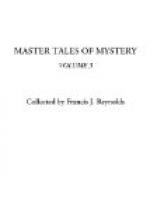“At once on being sure of this feature of the case I despatched a man to Hartford to see this inventor. The man obtained from him a complete list of all the dealers in New York to whom such devices had been sold. The man also traced every sale of those dealers. He did not actually obtain the weapon, but if he is working on schedule-time according to agreement he is at this moment armed with a search-warrant and is ransacking every possible place where the person suspected of this crime could have concealed his weapon. For, one of the persons intimately connected with this case purchased not long ago a silencer for a thirty-two-calibre revolver, and I presume that that person carried the gun and the silencer at the time of the murder of Kerr Parker.”
Kennedy concluded in triumph, his voice high pitched, his eyes flashing. Yet to all outward appearance not a heart-beat was quickened. Someone in that room had an amazing store of self-possession. The fear flitted across my mind that even at the last Kennedy was baffled.
“I had anticipated some such anti-climax,” he continued after a moment. “I am prepared for it.”
He touched a bell, and the door to the next room opened. One of Kennedy’s graduate students stepped in.
“You have the records, Whiting?” he asked.
“Yes, Professor.”
“I may say,” said Kennedy, “that each of your chairs is wired under the arm in such a way as to betray on an appropriate indicator in the next room every sudden and undue emotion. Though it may be concealed from the eye, even of one like me who stand facing you, such emotion is nevertheless expressed by physical pressure on the arms of the chair. It is a test that is used frequently with students to demonstrate various points of psychology. You needn’t raise your arms from the chair, ladies and gentlemen. The tests are all over now. What did they show, Whiting?”
The student read what he had been noting in the next room. At the production of the coat during the demonstration of the markings of the bullet, Mrs. Parker had betrayed great emotion, Mr. Bruce had done likewise, and nothing more than ordinary emotion had been noted for the rest of us. Miss La Neige’s automatic record during the tracing out of the sending of the note to Parker had been especially unfavorable to hear; Mr. Bruce showed almost as much excitement; Mrs. Parker very little and Downey very little. It was all set forth in curves drawn by self-recording pens on regular ruled paper. The student had merely noted what took place in the lecture-room as corresponding to these curves.
“At the mention of the noiseless gun,” said Kennedy, bending over the record, while the student pointed it out to him and we leaned forward to catch his words, “I find that the curves of Miss La Neige, Mrs. Parker, and Mr. Downey are only so far from normal as would be natural. All of them were witnessing a thing for the first time with only curiosity and no fear. The curve made by Mr. Bruce shows great agitation and—”




